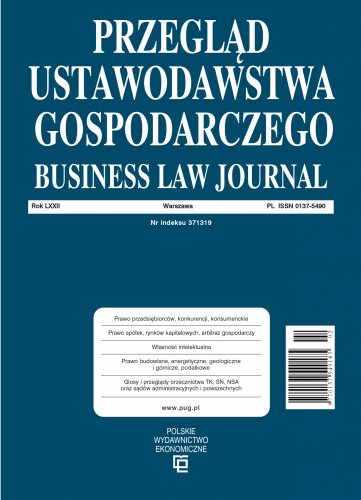Models of the competition assessment of restrictions "by object" — still at the crossroads between formal and economic approach
Competition law has established a distinction between agreements restricting competition 'by object' and 'by effect'. This division has a significant practical importance as in case of anticompetitive conduct consistent with these classified as a restriction 'by object' the competition authority's obligations to support its findings with the necessary evidence are much lowered — the competition authority does not need to prove the effects of the practice. However, there is still no uniform answer to the question of whether the presumption of harmfulness of by-object restrictions can be rebutted due to the context of a specific case. Polish jurisprudence does not provide an unambiguous answer, drifting between a formal and a more economic approach. More explicit conclusions in favor of an economic approach can be drawn from EU law. The aim of the article is to present and compare models of antitrust assessment of restrictions "by object" developed in Polish and EU jurisprudence, and to propose, on this basis, a solution, that should be adopted in Polish jurisprudence. The author argues in favor of the antitrust authority examining the broader economic context also in case of conducts that fall into the categories usually assessed as restrictions "by object", provided that an appropriate evidence and arguments exist that may refute the presumption of restriction of competition.
References
Bibliografia/References
Banasiński, C. (2015). Dyskrecjonalność w prawie antymonopolowym. Warszawa: Wolters Kluwer.
Banasiński, C., Piontek, E. (red.). (2009). Ustawa o ochronie konkurencji i konsumentów. Komentarz. Warszawa: LexisNexis.
Bellamy & Child (2013). European Community Law of Competition, 7th Edition. Oxford: Oxford University Press.
Fornalczyk, A., Skoczny, T. (red.) (2016). Economics of Competition Protection. Vertical Restraints/Ekonomia ochrony konkurencji. Ograniczenia wertykalne. Warszawa: Wydawnictwo Naukowe WZ UW.
Bolecki, A. (2012). Porozumienia zakazane ze względu na cel lub skutek — aktualne tendencje orzecznicze w Unii Europejskiej. Internetowy Kwartalnik Antymonopolowy i Regulacyjny, 3(1).
Jurkowska, A., Skoczny, T. (red.) (2008). Wyłączenia grupowe spod zakazu porozumień ograniczających konkurencję we Wspólnocie Europejskiej i w Polsce. Warszawa: Wydawnictwo Naukowe WZ UW.
Kohutek, K. (2014). Glosa do wyroku s. apel. z dnia 16 lipca 2013 r., VI ACa 1615/12, LEX/el.
Kohutek, K. (2020). Ujednolicanie cen w ramach franczyzy jako porozumienie mające antykonkurencyjny cel — uwagi krytyczne do wyroków Sądu Apelacyjnego w Warszawie z 10.01.2018 r., VII AGa 828/18 i Sądu Najwyższego z 9.10.2019 r., I NSK 89/18. Glosa, (3).
Materna, G. (2010). Wpływ prawa UE na polskie wyłączenia grupowe spod zakazu porozumień ograniczających konkurencję. Europejski Przegląd Sądowy, (5).
Materna, G. (2016). Zmowy przetargowe w prawie ochrony konkurencji i prawie karnym. Warszawa: Wolters Kluwer.
Materna, G. (2017). Wertykalne porozumienia cenowe — ewolucja orzecznictwa sądowego i praktyki decyzyjnej Prezesa UOKiK, Glosa, (2).
Miąsik, D. (2009). Porozumienia, których celem jest ograniczenie konkurencji w rozumieniu art. 81 ust. 1 TWE. Europejski Przegląd Sądowy, (8).
Nagy, C. I. (2013). The Distinction between Anti-competitive Object and Effect after Allianz: The End of Coherence in Competition Analysis? World Competition, (4).
Odudu, O. (2006). The Boundaries of EC Competition Law. The Scope of Article 81. Oxford: Oxford University Press. https://doi.org/10.1093/ acprof:oso/9780199278169.001.0001
Peeperkorn, L. (2015). Defining „by object” restrictions. Concurrences, (3).
Podrecki, P. (2014). Porozumienia ograniczające konkurencję. W: M. Kepiński (red.) System Prawa Prywatnego. Tom 15. Prawo konkurencji. Warszawa: C.H. Beck.
Turno, B. (2012). Kategoria porozumień zakazanych ze względu na cel w unijnym oraz polskim prawie ochrony konkurencji. Kwartalnik Prawa Publicznego, (2).
Whish, R., Bailey, D. (2012). Competition Law, 7th edition. Oxford: Oxford University Press.
Zawłocka-Turno, A., Turno, B. (2011). Ustalanie sztywnych lub minimalnych cen odsprzedaży jako porozumienie ograniczające konkurencję ze względu na cel (przedmiot) w prawie unijnym. Ruch Prawniczy, Ekonomiczny i Socjologiczny, (4).

